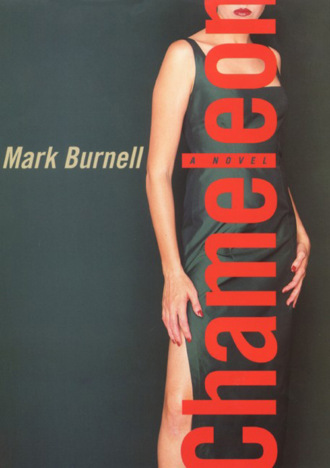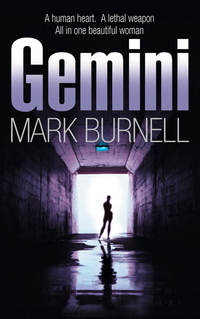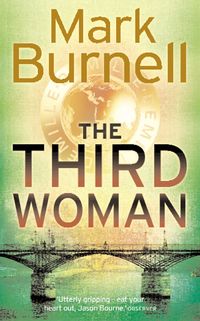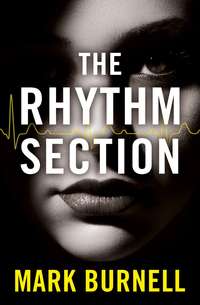
Полная версия
Chameleon
Seven fifteen. Masson entered the kitchen from the terrace, as he sometimes did, and stopped. On the floor, there was smashed crockery, shattered glass, cutlery. The wooden chair that had been next to the fridge was broken. Not just a slat here or a leg there, but destroyed.
He shouted her name but got no response.
In the sitting room, books had been torn from their shelves and hurled about the room. A turquoise china vase lay in pieces in the cast-iron grate. He ran upstairs to the bedroom; untouched, she wasn’t in it. Back in the kitchen, he noticed blood for the first time. A trail of glossy drops led through the back door and vanished into the coarse grass outside. He looked up and saw her sitting beneath an olive tree, legs dangling over a stone ledge.
‘Stephanie!’
She’d been ready to leave before Alexander had reached the road. But she hadn’t. She’d hesitated. Now, she found she couldn’t remember quite why. An hour had passed. Her mind had drifted. She’d been perversely calm. Later, she’d walked among the vines, and among the lemon trees on the steep bank that rose to the east. Sometime during the afternoon, though, the psychological anaesthetic had begun to fade. First there was sorrow, then incandescent fury.
‘Your hand,’ panted Masson, as he reached her and dropped to her side, ‘what happened to your hand?’
Both hands were in her lap. The left was lacerated over the back and across the knuckles. Sharp fragments protruded from dark sticky cuts.
‘What happened?’
She had no sequential recollection of the passage from late afternoon into early evening. The black rucksack was by the front door. She couldn’t remember putting it there but she did know that Franka Müller’s passport and Deutschmarks were tucked into a side pocket.
‘Should I call the police?’
She shook her head.
He began to protest but stopped himself. ‘You need to see a doctor.’
She saw herself spinning like a dancer. A whirlwind of fury, striking out at anything, her vision blurred by tears of frustration and rage. She wasn’t sure what she’d hit but the pain had been cathartic. As she knew it would be.
They turned off the main road, Masson’s Fiat creaking over the winding track. The headlights flickered on the vines, bugs dancing in weak yellow light. Neither had spoken since leaving Salernes. There were four stitches in the back of Stephanie’s left hand. The smaller cuts and grazes had been picked clean and disinfected. She’d declined the offer of painkillers.
They entered the kitchen. Masson’s eyes were drawn to the one thing he’d missed earlier: the gun by the sink. Stephanie watched him pick up the SIG and turn it over in his hands. She saw anxiety creep across his face.
‘Is this yours?’
She could see that he desperately wanted the answer to be no. ‘Yes.’
‘What are you doing with a piece of hardware like this, Stephanie?’
‘Don’t ask.’
‘I am asking. Just like I’m asking what happened here.’
‘I can give you answers, if you want. But they’ll be lies.’
‘You owe me more than this.’
‘I don’t owe you anything,’ she snapped. ‘No commitments, remember?’
‘Don’t you think this is different?’
‘I think we all have our secrets, Laurent. Pieces of the past that are better left in the past.’ She let him consider that for a few seconds. ‘What do you think?’
He turned away from her. ‘I think I’ll start to clear up some of this mess.’
She reached out and put her good hand on his arm. ‘Not now. It can wait.’
They ate bread and cheese. Masson opened a bottle of wine. They sat at the table on the terrace listening to the chorus of cicadas. When they’d finished, he cleared away their plates and returned with coffee and a dusty bottle of Armagnac. She said she didn’t want any. He said it was medicinal, so she relented and he poured an inch into a dirty tumbler.
When she’d decided not to run, she hadn’t had a reason. It had simply been instinct. Now, she saw why. Alexander had been unarmed. Subconsciously, that fact had registered. No gun, no accomplices, no protection at all. Under the circumstances, an incredible risk. She could have killed him in a moment. He would have had no chance at all. Hindsight prompted the question: why?
Masson poured a glass for himself. ‘Look, about before. If you don’t want to talk about it, that’s okay. But if you do, you can trust me.’
‘I know.’ She gathered her tumbler in both hands and stared at her stitches. ‘Someone came to see me today.’
‘Who?’
‘A man from my past.’
‘What did he want?’
‘A bit of my future.’
‘What are you going to do?’
‘I don’t know yet.’
Masson avoided eye contact and made a show of picking at a thread on the seam of his trousers. ‘That gun … I mean, if you’re in some kind of trouble … if you need help, there are people I used to know who …’
‘I know.’
He looked up at her. ‘You know what?’
‘Why you’re a mechanic.’
‘I’m sorry?’
‘I know you like cars, Laurent. You like them a lot.’
They sat in silence for a minute before Masson spoke again. ‘Anyway, like I was saying, I know some people who –’
‘It won’t make a difference.’
‘Well, if you change your mind …’
‘Thanks.’
He lit a cigarette. ‘The people in those photographs in the kitchen. Who are they?’
Stephanie shrugged. ‘Just a family I used to know.’
The struggle lasted through Tuesday and Wednesday. She barely slept, barely ate. Sometimes she panicked, sometimes she was almost catatonic. All her arguments seemed circular; her new life was worth fighting for, worth revisiting the past for, except nothing was worth that, nothing except the chance to leave it behind permanently.
On Wednesday, she spent the whole day in the hills, beneath a fierce sun, among the jagged rocks and thorny bushes. She could run, she knew that. And perhaps she’d stay ahead of Magenta House but for how long? If she stopped, they’d find her again. She saw now that it would only be a matter of time. And even if they didn’t find her, the possibility would linger. No matter how hard she tried to pretend it hadn’t, the threat had always been there.
More than anything, she wanted to stop running. The life she’d created for herself at the farmhouse had taught her that, if nothing else. Ultimately, she didn’t know where she was destined to settle. But that didn’t matter. It was the act that was important, not the location. To abandon the dream was to let Alexander win. That had been the insurance against the risk he’d taken in approaching her unarmed. He hadn’t offered his word as a guarantee because he knew she’d reject it – there could never be trust between them – but perhaps the risk had been a gesture of good faith.
By dusk, her feet were blistered, her skin burnt, her mind scorched.
The pretence was over, the memories resurrected. That night, she couldn’t sleep. Repulsion, fear and anger kept her awake. Later, at dawn, there were moments when she almost convinced herself that it wouldn’t be too bad. It’s just one job. But she knew that wasn’t true. Eighteen months of a real life had seen to that. No amount of effort would ever reclaim the edge she’d once had. Despite everything, that made her happy because it made her human.
Magenta House. An organization that doesn’t exist, run by people who don’t exist. An ironic consequence of the modern era. In a time of greater openness, somebody still has to get into the sewer to deal with the rats.
I don’t know how many assassins Magenta House operates – four or five, I should think, perhaps six – but I do know that I was unique among them. They were simply trained in the art of assassination. I was trained for more. Operating under the alias Petra Reuter – a German student turned activist turned mercenary terrorist – I was taught to infiltrate, seduce, lie, eavesdrop, steal, kill. I learnt how to withstand pain and how to inflict it.
It’s been four years since I vanished and I’ve been running ever since, first as Petra, then as me. Even now, after more than a full year living here, I’m still on the run. Alexander’s terms represent an opportunity to stop.
On paper, it’s an easy choice. One job buys any future I want. But I’ve changed since I stopped being Petra. I think I’m becoming the person Stephanie Patrick should have been. And that’s the problem. She might be difficult and selfish – she might be a complete bitch – but she’s not an assassin. Not like Petra, who was never anything else.
I find myself thinking about people like Jean-Marc Houtens, Li Ching Xai, John Peltor, Zvonimir Vujovic, Esteban Garcia. Like Petra Reuter, they are names without faces. I wonder what they’re doing at this precise moment, wherever in the world they are. Petra’s was never a large profession. Sure, you can find a killer on a street corner in the run-down district of any city. You can even find self-styled assassins relatively easily; in the Balkans, or the Middle East, you can’t move for enthusiastic amateurs. But those of us who formed the elite numbered no more than a dozen. Our backgrounds were diverse but we were united by the quality of our manufacture.
I used to imagine meeting other members of the club. I pictured us around a table in a restaurant, trading industry secrets, putting faces to names, assessing the competition. I’d hear gossip from time to time. Usually from Stern, the information broker, who’d offer a morsel in the hope that I would pay for something juicier. For instance, I know that former US Marine John Peltor was responsible for the Kuala Lumpur car-bomb that killed the Indonesian ambassador last year. And that Li Ching Xai was the one who murdered Alfred Reed, founder of the Reed Media Group, in Mumbai in May 1999. A five-hundred-yard head shot in a stiff crosswind, according to Stern.
When I was Petra Reuter, none of the concerns of Stephanie Patrick affected me. Nor did any of the issues surrounding my profession. I didn’t worry about morality. I worried about efficiency. I didn’t worry about the target. If I was offered the contract, he or she was already dead because if I didn’t accept the work, somebody else would. When I looked through a telescopic sight, or into the eyes of the victim, I never saw a person. I never thought about the money, either; that came later. Instead, I was always thinking … would any of the others have done this better than me?
As any female in a predominantly male profession knows, you have to be better than the men just to be equal with them.
Thursday morning. Stephanie watched the sun come up from the terrace. It was chilly for a while. Later, Masson appeared, a cup of coffee in his hand, stubble on his jaw.
‘So, you’re going, then?’
‘You saw the bag?’
‘I saw what you’re leaving behind.’
‘Meaning?’
‘The clothes you’ve left in the cupboard – well, I wouldn’t take them either.’
‘They wouldn’t fit you.’
‘You’d be surprised what I can get into.’
‘The image in my mind is not a pretty one.’
He grinned, then said, ‘Look, are you sure you know what you’re doing?’
‘To be honest, not really. But I know what will happen if I don’t go and that’s something I can’t face. The last year and a bit has been really good for me but before that, well …’
‘What?’
She sighed deeply. ‘For a long time, it was a bad time.’
‘You’re not the only one,’ he said, in a tone that was sympathetic rather than confrontational.
‘I know.’
‘What did you do?’
‘You don’t want to know.’
‘Stephanie …’
‘Just like I don’t want to know about your convictions for auto-theft.’
For a moment, he was stunned. Then he shook his head. ‘You knew?’
‘Not until the other day. But that’s the world I was in. I knew things I never wanted to know. Saw things I wish I could forget. For months, then years, I drifted from one bad hotel to another, from one country to the next, and the things I did … they were …’
She faltered and he put his hands on her shoulders. ‘It doesn’t matter.’
Looking at Masson, she felt helpless. ‘Laurent, I’m sorry.’
‘It’s okay.’
‘Are you sure?’
‘I’m sure.’
‘I should have said something.’
‘No. I don’t think so. We’ve had a good time, just the way it’s been.’
She couldn’t bring herself to look into his eyes. ‘True.’
‘I always knew it wouldn’t be forever with you. That was part of the attraction.’
‘Thanks very much.’
‘You know what I mean.’
She nodded. ‘I am planning on coming back, though. If I can …’
He took her right hand in his. ‘Let’s not talk about it. Let’s sit here and drink coffee in the sun. We can pretend you’re going away and that you’ll be back for the weekend. I’ll cook something special for you. We’ll make love, drink too much wine. And we’ll do the same thing the day after, the week after … and before you know it, summer will be gone and it’ll be autumn.’
Конец ознакомительного фрагмента.
Текст предоставлен ООО «ЛитРес».
Прочитайте эту книгу целиком, купив полную легальную версию на ЛитРес.
Безопасно оплатить книгу можно банковской картой Visa, MasterCard, Maestro, со счета мобильного телефона, с платежного терминала, в салоне МТС или Связной, через PayPal, WebMoney, Яндекс.Деньги, QIWI Кошелек, бонусными картами или другим удобным Вам способом.




